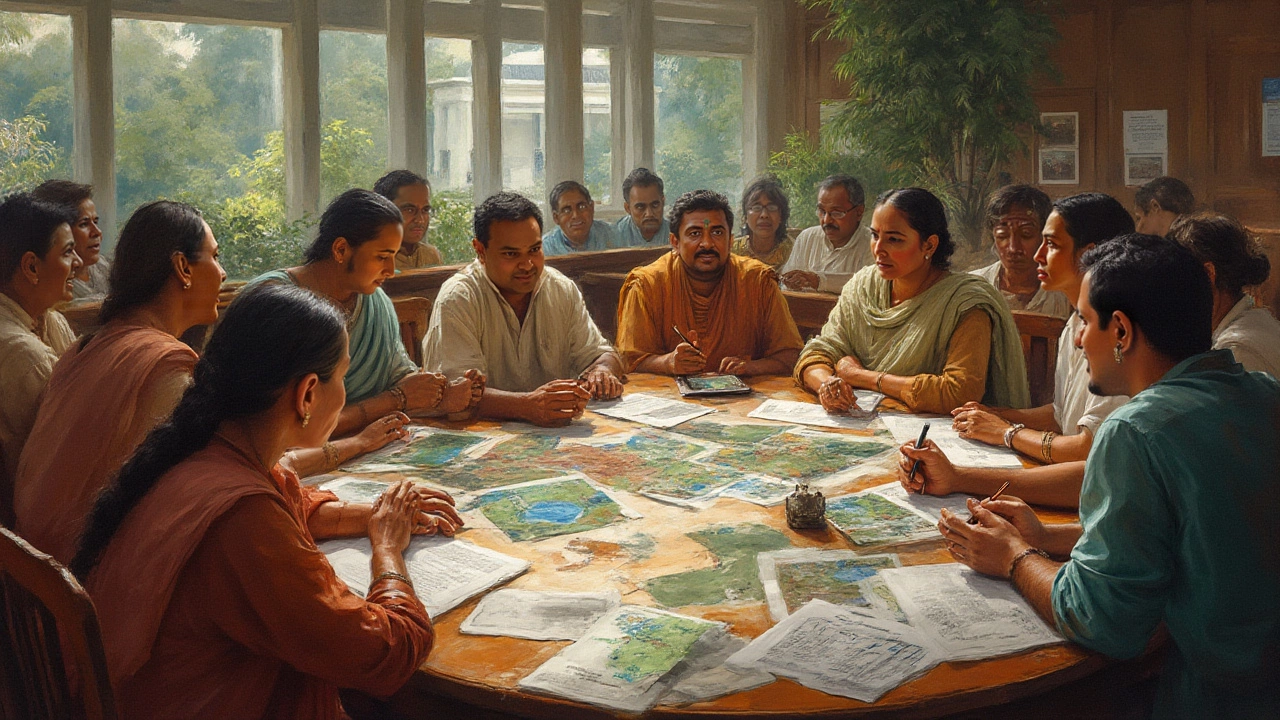Imagine finding out your local river is cleaner this year or your favorite wildlife park is getting expanded. Ever wondered who actually makes this stuff happen? It isn’t just some politician in a posh office, but a real mix of passionate people, groups, and even ordinary folks like you and me. There’s a web of movers and shakers behind every new plastic ban, forest protection law, or climate deal shaping life on Earth right now. With every historic conference or urgent public protest flooding our feeds, the question pops up: who’s pulling the strings behind these crucial environmental policies?
Government Bodies: The Engine Room of Policy
First up, let’s talk about the role of governments. These are the decision-makers who translate aspirations and research into actual laws that make a difference. Across the world, ministries and departments specifically focused on the environment are at the heart of this engine. In the UK, for instance, the Department for Environment, Food & Rural Affairs (DEFRA) doesn’t just regulate; it sets and updates the rules that protect natural spaces, manage agriculture, and keep emissions in check. DEFRA is also leading the government’s commitment to reach net zero by 2050—one of the most aggressive climate goals of any major economy.
To make the right moves, government bodies often pull in scientists, economists, and technical experts from within and outside. It’s not just about reading reports, though. Committees—like the Environment, Food and Rural Affairs Select Committee—scrutinise proposals, hold public consultations, and listen to what ordinary people say on things like banning single-use plastics. Even the local councils play a huge part, tweaking recycling rules or pushing through eco-friendly public transport that you use every day.
It gets interesting when crises force quick change. Remember the summer 2022 heatwave? UK’s government departments worked swiftly to approve new urban cooling measures and widen their air quality monitoring. Globally, government bodies agree on big concepts at summits like the UN Climate Change Conference (COP26 was in Glasgow), but it’s their foot soldiers—their policy officers and analysts—back home who figure out how to actually deliver cleaner rivers, greener streets, and smarter farming.
One epic fact: In 2023, the European Union passed the world’s first law to restore 20% of its land and sea by 2030. That kind of ambition is set in government chambers, but often gets a mighty push from the outside—by scientists, charities, and the public. So, when you hear about some groundbreaking eco-jump, it’s usually a team sport, with government departments holding the whistle (and, yes, occasionally dropping it).

Non-Governmental Organisations: The Pressure and the Voice
When governments drag their feet, NGOs and charities step in and ramp up the heat. Greenpeace and Friends of the Earth are practically household names—synonymous with fearless climate campaigns and headline-grabbing protests. But their influence goes way deeper than chaining themselves to oil rigs. These groups act as watchdogs, making sure politicians don’t forget their promises or quietly tone down ambitious policies.
Here’s the scoop: Greenpeace, founded in 1971, has orchestrated major campaigns that pushed governments all over the world to ban toxic chemicals and shut down whale hunts. And it isn’t just about loud activism—these groups employ real policy experts who sit at the negotiation tables at United Nations climate talks. Greenpeace drafted key text on the 2015 Paris Agreement, which pledged countries to keep global heating below 2°C. Not too shabby for a group started by a bunch of Vancouver hippies!
Meanwhile, Friends of the Earth actually has a whole “law and policy” section dedicated to helping people use the legal system to protect nature in their own backyards. In recent years, they’ve helped win court battles that stopped oil drilling near precious habitats, and kept local councils from weakening green protections.
What about less famous groups? Extinction Rebellion—XR for short—popped up in 2018 and got thousands of regular folks glued to the streets, which forced politicians to declare ‘climate emergency’ in over 1,400 towns and cities, including places as tiny as Hebden Bridge. Sometimes, only a noisy, clever campaign can spark changes politicians aren’t keen to tackle on their own due to short electoral cycles.
Beyond the drama, NGOs provide the evidence policymakers need. WWF (formerly World Wide Fund for Nature) publishes rigorous reports—like their Living Planet Report, which tracks wildlife loss since the 1970s—and tells governments exactly where they’re failing or making progress. In 2022, WWF’s UK branch convinced policymakers to launch more ‘blue belt’ protections for British marine life, covering 355,000 square kilometres of ocean territory.
| NGO | Key Area | Big Win | Founded |
|---|---|---|---|
| Greenpeace | Pollution, Oceans, Whaling | Influenced Paris Agreement Text | 1971 |
| Friends of the Earth | Climate, Law, Community Actions | Won UK Air Pollution Lawsuit (2021) | 1971 |
| WWF | Biodiversity, Marine, Forests | UK’s ‘Blue Belt’ Coastal Protections | 1961 |
If you’re keen to get involved, many NGOs encourage regular people to comment on green bills or sign open letters—sometimes making a bigger impact than online rants ever could.

Scientists, Activists, and International Bodies: The Unsung Shapers
What do climate models, angry school kids, and UN panels have in common? They’re all powering the new wave of environmental policies from behind the scenes. Scientists, obviously, supply the hard facts—no one gets away with hand-waving on climate predictions these days. The Intergovernmental Panel on Climate Change (IPCC) doesn’t make laws, but its global climate reports land on every lawmaker’s desk. When the IPCC delivered its “Code Red for humanity” warning in 2021, policymakers from Canada to Kenya scrambled to strengthen their net-zero promises.
Dig deeper and you’ll find research labs and think tanks—like the Grantham Institute in London—pumping out actionable advice faster than ever. These experts help governments avoid greenwashing and choose policies that actually lower emissions. A cool stat: 85% of current UK climate targets were shaped using recommendations from independent experts, not just in-house government analysts.
On a different track, activist movements have exploded. Greta Thunberg and Fridays for Future inspired millions of school strikes that forced climate onto the front pages and into parliamentary debates. These protests convinced Germany to bring forward its coal exit to 2038, with other countries now following suit. You can’t ignore the sight of thousands of kids in high-vis vests, chanting for greener futures—it shifts what’s possible much faster than a closed-door policy meeting ever could.
Don’t underestimate international bodies, either. The United Nations Environment Programme (UNEP), born in 1972, now shapes eco-policy across continents. It hosts annual summits, lobbies national leaders, and sets gigantic targets—like reducing global chemical waste by 2030—that local planners then translate into real-life regulations. The recent Global Plastics Treaty talks, for example, brought together more than 175 nations to phase out wasteful plastic production by the end of the decade.
It’s not just big science or drama—sometimes local voices make super-specific changes matter. Community groups, like The Wildlife Trusts or Surfers Against Sewage right here in the UK, spot problems the big players miss. Their beach cleanups, river monitoring, and pressure on MPs for better sewage oversight mean that thousands of water bodies are now cleaner and safer than a decade ago.
So, when you spot a ban on single-use cutlery or see extra wildflower meadows springing up near your street, think of the web of individuals and organisations—government policy wonks, fiery activists, scientific masterminds, and nose-to-the-grindstone local charities. They're the backbone of environmental progress, and their day-to-day battles end up shaping the green rules that change your world.
